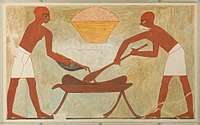Basbousa
 Basbousa topped with walnuts | |
| Alternative names | Basbuusa, Şambalı, Samali, Kalo prama[1] |
|---|---|
| Type | Dessert |
| Place of origin | Egypt |
| Region or state | Arab world (Levant, Middle East, North Africa), Horn of Africa, the Balkans, Pakistan, Middle East, Syria, Lebanon, Cyprus, Armenia, Tunisia, Egypt, Kuwait, Iran, Turkey |
| Serving temperature | Cold |
| Main ingredients | Semolina or farina, syrup, yogurt |
| Variations | Orange blossom syrup or rose |
| Calorie rich kcal | |
 |
| This article is part of a series on |
| Egyptian cuisine |
|---|
| History |
| Articles |
| Related cuisines |
|
Basbousa (Arabic: بسبوسة), is a traditional Middle Eastern sweet cake.[2] It is made from cooked semolina or farina soaked in simple syrup[3]; coconut is also a popular option to add into this pastry. Orange flower water or rose water is also an optional addition to the simple syrup used in the basbousa.
Shambali or Damascus honey (Turkish: Şambalı or Şam tatlısı, meaning "Damascus dessert", Greek: Σάμαλι /ˈʃamali/), is a very popular Middle Eastern semolina cake often flavoured with orange blossom water or rose syrup. Its ingredients include but are not limited to; yogurt, coarse semolina, sugar, ground almonds, lemon/orange juice and cinnamon. It is usually served with tea that does not contain sugar due to its very sweet taste. There are theories the name 'Shamali' derives from the town of Şam (located in Damascus Syria). It is more likely however that the name comes from Armenia where it is still commonly known as Shamali. Elsewhere the dessert is known as 'Kalo Brama' in Cyprus meaning "Good thing", 'Namoura' in Lebanon, Kalbelouz (Qhalb-el-Louz), in Tunis, Revani or Ravani in Greece and Turkey (itself deriving directly from the Persian), and commonly known as Babousa/Basbousa amongst other Arabic speaking communities.
Names
Basbousa has many regional and dialect names (Arabic: بسبوسة basbūsah, هريسة harīsa, and nammoura (in Lebanon[4]), Armenian: Շամալի shamali, Turkish: revani or ravani (from Persian[5]), French: gabelouze, kalbelouz, and qualb-el-louz (in Tunisian French), Greek: ραβανί and ρεβανί).
It is found in the cuisines of the Middle East, the Balkans and the Horn of Africa under a variety of names. In southern Greece, it is called ravani, while in the north, it is called revani. Basbousa is often called "hareesa" in Jordan, the Maghreb, and the Egyptian city of Alexandria. Basbousa is a particularly popular dessert among the Egyptian Coptic Christians for fasts, such as Great Lent and the Nativity Fast as it can be made vegan.
Pastūsha
Pastūsha (sometimes stylized as Pastūçha) is a variant of basbousa that originated in Kuwait in the 2010s. Like basbousa, it is made from semolina soaked in sweet syrup. It is characterized by the addition of finely ground pistachios and orange flower water.
See also
References
- ↑ "Καλόν πράμαν ή σιάμαλι". foodmuseum.cs.ucy.ac.cy (in Greek). Cyprus Food Virtual Museum. Retrieved 26 November 2015.
- ↑ The Recipes of Africa. p. 241. Retrieved 2014-07-18.
- ↑ "Arabic Dessert".
- ↑ "Taste of Beirut: Citrus muffins (Nammoura)". Archived from the original on 2014-07-21. Retrieved 2014-07-18.
- ↑ "Nishanyan - Turkish etymological dictionary: Revani (in Turkish)". Retrieved 2014-07-18.
Works cited
- Davidson, Alan (2014). Oxford companion to food. [S.l.]: Oxford University Press. ISBN 978-0199677337.
